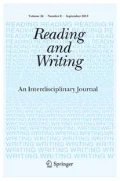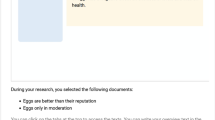Abstract
Multiple text comprehension can greatly benefit from paying attention to sources and from using this information for evaluating text information. Previous research based on texts from the domain of history suggests that source-related strategies are acquired as part of the discipline expertise as opposed to the spontaneous use of these strategies by students just entering a field. In the present study, we compared the performance of students and scientists in the domain of psychology with regard to (a) their knowledge of publication types, (b) relevant source characteristics, (c) their use of sources for evaluating the credibility of multiple texts, and (d) their ability to judge the plausibility of argumentative statements in psychological texts. Participants worked on a battery of newly developed computerised tests with a think-aloud instruction to uncover strategies that scientists and students used when reading a text. Results showed that scientists scored higher in all of the assessed abilities and that these abilities were positively correlated with each other. Importantly, the superior performance of scientists in evaluating the credibility of multiple texts was mediated by their use of source information. Implications are discussed in terms of discipline expertise.



Similar content being viewed by others
References
Alexander, P. A., & Fox, E. (2011). Adolescents as readers. In M. L. Kamil, P. D. Pearson, E. B. Moje, & P. P. Afflerbach (Eds.), Handbook of reading research (Vol. 4, pp. 157–176). New York: Taylor & Francis.
Amstad, T. (1978). Wie verständlich sind unsere Zeitungen? [How understandable are our newspapers?]. Unpublished Doctoral Dissertation, University of Zürich, Switzerland.
Anderson, R. C. (1978). Schema-directed processes in language comprehension. In A. M. Lesgold, J. W. Pellegrino, S. D. Fokkema, & R. Glaser (Eds.), Cognitive psychology and instruction (pp. 67–82). New York: Plenum.
Bazerman, C. (1985). Physicists reading physics: Schema-laden purposes and purpose-laden schema. Written Communication, 2, 3–23.
Blanchard, J. S., & Samuels, S. J. (2015). Common core state standards and multiple-source reading comprehension. In P. D. Pearson & E. H. Hiebert (Eds.), Research-based practices for teaching common core literacy (pp. 93–105). New York: Teachers College Press.
Bråten, I., Strømsø, H. I., & Britt, M. A. (2009). Trust matters: Examining the role of source evaluation in students’ construction of meaning within and across multiple texts. Reading Research Quarterly, 44, 6–28.
Bråten, I., Strømsø, H. I., & Salmerón, L. (2011). Trust and mistrust when students read multiple information sources about climate change. Learning and Instruction, 21, 180–192.
Britt, M. A., & Aglinskas, C. (2002). Improving student’s ability to use source information. Cognition and Instruction, 20, 485–522.
Britt, M. A., & Larson, A. (2003). Construction of argument representations during on-line reading. Journal of Memory and Language, 48, 749–810.
Britt, M. A., Perfetti, C. A., Sandak, R., & Rouet, J.-F. (1999). Content integration and source separation in learning from multiple texts. In S. R. Goldman, A. C. Graesser, & P. van den Broek (Eds.), Narrative comprehension, causality, and coherence: Essays in honor of Tom Trabasso (pp. 209–233). Mahwah, NJ: Erlbaum.
Britt, M. A., Richter, T., & Rouet, J.-F. (2014). Scientific literacy: The role of goal-directed reading and evaluation in understanding scientific information. Educational Psychologist, 49, 104–122.
Britt, M. A., & Rouet, J.-F. (2012). Learning with multiple documents: Component skills and their acquisition. In J. R. Kirby & M. J. Lawson (Eds.), Enhancing the quality of learning: Dispositions, instruction, and learning processes (pp. 276–314). New York: Cambridge University Press.
Bromme, R., & Goldman, S. (2014). The public’s bounded understanding of science. Educational Psychologist, 49, 59–69.
Brooks, G. (2011). Adult literacy. In M. L. Kamil, P. D. Pearson, E. B. Moje, & P. P. Afflerbach (Eds.), Handbook of reading research (Vol. 4, pp. 177–196). New York: Taylor & Francis.
Chen, S., & Chaiken, S. (1999). The heuristic systematic model in its broader context. In S. Chaiken & Y. Trope (Eds.), Dual-process theories in social and cognitive psychology (pp. 73–96). New York: Guilford.
Chung, M., Oden, R. P., Joyner, B. L., Sims, A., & Moon, R. Y. (2012). Safe infant sleep recommendations on the Internet: Let’s google it. The Journal of Pediatrics, 161, 1080–1084.
Dauer, F. W. (1989). Critical thinking: An introduction to reasoning. New York: Oxford University Press.
Duke, N. K., & Carlisle, J. (2011). The development of comprehension. In M. L. Kamil, et al. (Eds.), Handbook of reading research (Vol. 4, pp. 199–228). New York: Taylor & Francis.
Flanagin, A. J., & Metzger, M. J. (2000). Perceptions of internet information credibility. Journalism and Mass Communication Quarterly, 77, 515–540.
Flanagin, A. J., & Metzger, M. J. (2001). Internet use in the contemporary media environment. Human Communication Research, 27, 153–181.
Flesch, R. (1948). A new readability yardstick. Journal of Applied Psychology, 32, 221–233. doi:10.1037/h0057532.
Fuchs, R., & Schwarzer, R. (1997). Tabakkonsum: Erklärungsmodelle und Interventionsansätze [Tobacco consumption: Explanations and interventions]. In R. Schwarzer (Ed.), Gesundheitspsychologie: Ein Lehrbuch (pp. 209–244). Göttingen: Hogrefe.
Goldman, S. R., & Bisanz, G. L. (2002). Toward a functional analysis of scientific genres: Implications for understanding and learning processes. In J. Otero, J. A. León, & A. C. Graesser (Eds.), The psychology of science text comprehension (pp. 417–436). Mahwah, NJ: Erlbaum.
Goldman, S., Braasch, J. L., Wiley, J., Graesser, A. C., & Brodowinska, K. (2012). Comprehending and learning from internet sources: Processing patterns of better and poorer learners. Reading Research Quarterly, 47, 356–381.
Goldman, S., & van Oostendorp, H. (1999). Conclusions, conundrums, and challenges for the future. In H. van Oostendorp & S. Goldman (Eds.), The construction of mental representations during reading (pp. 323–330). Mahwah, NJ: Erlbaum.
Inquisit (Version 3.0.6.0) [Computer software]. Retrieved from http://de.hyperionics.com/.
Kamil, M. L., Pearson, P. D., Moje, E. B., & Afflerbach, P. P. (2011). Handbook of reading research (Vol. 4). New York: Taylor & Francis.
Kintsch, W. (1988). The role of knowledge in discourse comprehension: A construction-integration model. Psychological Review, 95, 163–182.
Korpan, C. A., Bisanz, G. L., Bisanz, J., & Henderson, J. M. (1997). Assessing literacy in science: Evaluation of scientific news briefs. Science Education, 81, 515–532.
Luke, C., de Castell, S. C., & Luke, A. (1989). Beyond criticism: The authority of the school textbook. In S. C. de Castell, A. Luke, & C. Luke (Eds.), Language, authority, and criticism (pp. 245–260). Falmer: London.
Lundeberg, M. A. (1987). Metacognitive aspects of reading comprehension: Studying understanding in legal case analysis. Reading Research Quarterly, 22, 407–432.
Matsuki, K., Chow, T., Hare, M., Elman, J. L., Scheepers, C., & McRae, K. (2011). Event-based plausibility immediately influences on-line language comprehension. Journal of Experimental Psychology, 37, 913–934.
Mayer, R. (1989). Models for understanding. Review of Educational Research, 59, 43–64.
Metzger, M. J., Flanagin, A. J., & Zwarun, L. (2003). College student web use, perceptions of information credibility, and verification behavior. Computers & Education, 41, 271–290.
Moje, B. M., Stockdill, D., Kim, K., & Kim, H. (2011). The role of text in disciplinary learning. In M. L. Kamil, et al. (Eds.), Handbook of reading research (Vol. 4, pp. 453–481). New York: Taylor & Francis.
Nokes, J. D., Dole, J. A., & Hacker, D. J. (2007). Teaching high school students to use heuristics while reading historical texts. Journal of Educational Psychology, 99, 492–504. doi:10.1037/0022-0663.99.3.492.
Norris, S. P., & Phillips, L. M. (2003). How literacy in its fundamental sense is central to scientific literacy. Science Education, 87, 224–240.
OECD (2013). PISA 2015 draft reading framework. Retrieved from http://www.oecd.org/pisa/pisaproducts/pisa2015draftframeworks.html.
Paxton, R. J. (1997). “Someone with like a life wrote it”: The effects of a visible author on high school history students. Journal of Educational Psychology, 89, 235–250.
Petty, R. E., & Cacioppo, J. T. (1986). Communication and persuasion: Central and peripheral routes to attitude change. New York: Springer.
Petty, R. E., & Wegener, D. T. (1999). The elaboration likelihood model: Current status and controversies. In S. Chaiken & Y. Trope (Eds.), Dual-process theories in social psychology (pp. 41–72). New York: Guilford Press.
Pressley, M. (2000). What should comprehension instruction be the instruction of? In M. L. Kamil, P. Mosenthal, P. D. Pearson, & R. Barr (Eds.), Handbook of reading research (Vol. 3, pp. 545–562). Mahwah, NJ: Erlbaum.
Richter, T. (2003). Epistemologische Einschätzungen beim Textverstehen [Epistemic validation in text comprehension]. Lengerich: Pabst Science Publishers.
Richter, T., & Schmid, S. (2010). Epistemological beliefs and epistemic strategies in self-regulated learning. Metacognition and Learning, 5, 47–65.
Richter, T., Schroeder, S., & Wöhrmann, B. (2009). You don’t have to believe everything you read: Background knowledge permits fast and efficient validation of information. Journal of Personality and Social Psychology, 96, 538–558.
Rouet, J.-F., & Britt, M. A. (2011). Relevance processes in multiple document comprehension. In M. T. McCrudden, J. P. Magliano, & G. Schraw (Eds.), Text relevance and learning from text (pp. 19–52). Greenwich, CT: Information Age Publishing.
Rouet, J.-F., Britt, M. A., Mason, R. A., & Perfetti, C. A. (1996). Using multiple sources of evidence to reason about history. Journal of Educational Psychology, 88, 478–493.
Rouet, J.-F., Favart, M., Britt, M. A., & Perfetti, C. A. (1997). Studying and using multiple documents in history: Effects of discipline expertise. Cognition and Instruction, 15, 85–106.
Schlagmüller, M., & Schneider, W. (2007). Würzburger Lesestrategie-Wissenstest für die Klassen 7–12. Göttingen: Hogrefe.
Schroeder, S., Richter, T., & Hoever, I. (2008). Getting a picture that is both accurate and stable: Situation models and epistemic validation. Journal of Memory and Language, 59, 237–255.
Strømsø, H. I., Bråten, I., & Britt, M. A. (2010). Reading multiple texts about climate change: The relationship between memory for sources and text comprehension. Learning and Instruction, 20, 192–204.
Toulmin, S. E. (1958). The uses of argument. Cambridge, MA: Cambridge University Press.
Voss, J. F., & Means, M. L. (1991). Learning to reason via instruction in argumentation. Learning & Instruction, 1, 337–350.
Wiley, J., Goldman, S. R., Graesser, A. C., Sanchez, C. A., Ash, I. K., & Hemmerich, J. (2009). Source evaluation, comprehension, and learning in internet science inquiry tasks. American Educational Research Journal, 46, 1060–1106.
Wineburg, S. (1991). Historical problem solving: A study of the cognitive processes used in the evaluation of documentary and pictorial evidence. Journal of Educational Psychology, 83, 73–87.
Wolfe, C. R., Britt, M. A., & Butler, J. A. (2009). Argumentation schema and the myside bias in written argumentation. Written Communication, 26, 183–209.
Wyatt, D., Pressley, M., El-Dinary, P. B., Stein, S., Evans, P., & Brown, R. (1993). Comprehension strategies, worth and credibility monitoring, and evaluations: Cold and hot cognition when scientists read professional articles that are important to them. Learning and Individual Differences, 5, 49–72.
Zwaan, R. A. (1994). Effect of genre expectations on text comprehension. Journal of Experimental Psychology, 20, 920–933.
Acknowledgments
This research was supported by the German Federal Ministry of Education and Research (BMBF; grants 01PK11017B and 01PK11017A).
Author information
Authors and Affiliations
Corresponding author
Rights and permissions
About this article
Cite this article
von der Mühlen, S., Richter, T., Schmid, S. et al. The use of source-related strategies in evaluating multiple psychology texts: a student–scientist comparison. Read Writ 29, 1677–1698 (2016). https://doi.org/10.1007/s11145-015-9601-0
Published:
Issue Date:
DOI: https://doi.org/10.1007/s11145-015-9601-0




